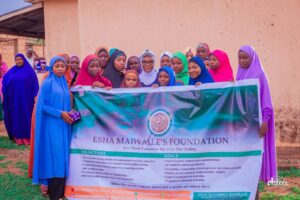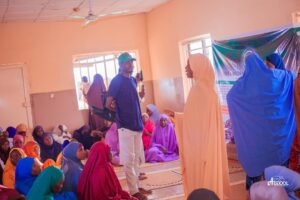By Sadiya Musa, Bauchi
In the dusty townships of Misau, Bauchi State, a quiet revolution is taking place.
Spearheaded by the Esha Maiwalle Foundation, hundreds of schoolgirls and women from underserved communities are receiving what many around the world take for granted: access to sanitary pads, and with them, a renewed sense of dignity, health, and opportunity.
The foundation, led by humanitarian advocate Aisha Muhammad Maiwalle, has launched a large-scale sanitary pad distribution initiative aimed at ending period poverty, a long-standing barrier that disproportionately affects women and girls in rural Nigeria.
The campaign focuses on restoring confidence and empowering girls to remain in school during menstruation, rather than staying home in shame or discomfort.
 “Every woman and girl deserves to live with dignity and have access to basic necessities like sanitary pads,” said Maiwalle. “We are committed to breaking barriers that limit the potential of women and girls in our communities.”
“Every woman and girl deserves to live with dignity and have access to basic necessities like sanitary pads,” said Maiwalle. “We are committed to breaking barriers that limit the potential of women and girls in our communities.”
In Nigeria, millions of girls miss school each year due to inadequate access to menstrual hygiene products. For many, a single menstrual cycle can mean lost learning days, embarrassment, and long-term educational setbacks. The stigma surrounding menstruation further deepens the problem, isolating girls at a critical point in their development.
The Esha Maiwalle Foundation’s initiative is not only responding to an urgent local need but is also aligning with global goals for gender equality and health, such as the United Nations Sustainable Development Goals (SDG 3 and 5). By addressing menstrual health, the Foundation is taking a bold step toward creating a more inclusive and equitable society.
The distribution programme in Misau Local Government Area was accompanied by awareness sessions on menstrual hygiene, led by trained health workers. Mothers, teachers, and community leaders were also involved, helping to dismantle cultural taboos and foster open conversations about menstrual health.
“This initiative is not just about pads, it’s about power, participation, and progress. We are seeing girls stand taller, speak more confidently, and attend school with pride”,
said one community health worker who partnered with the Foundation.
For many recipients, the intervention is life-changing. One teenage beneficiary, Amina, shared, “Before now, I used rags during my period and often stayed home from school. Now, I feel free and clean. I am grateful to the Esha Maiwalle Foundation for giving us hope.”
Following the success in Misau, the Foundation plans to expand its efforts across other local governments in Bauchi and neighboring states. Discussions are already underway with educational institutions and NGOs to scale up the reach and sustainability of the program.
“This is just the beginning. We envision a Bauchi and a Nigeria, where no girl is left behind because of her period”, Maiwalle said.
 In a world where menstrual hygiene is still a luxury for many, the Esha Maiwalle Foundation’s work stands as a powerful example of community-driven change. By restoring dignity through a simple yet transformative act, the foundation is not only changing lives, it is reshaping futures.
In a world where menstrual hygiene is still a luxury for many, the Esha Maiwalle Foundation’s work stands as a powerful example of community-driven change. By restoring dignity through a simple yet transformative act, the foundation is not only changing lives, it is reshaping futures.























